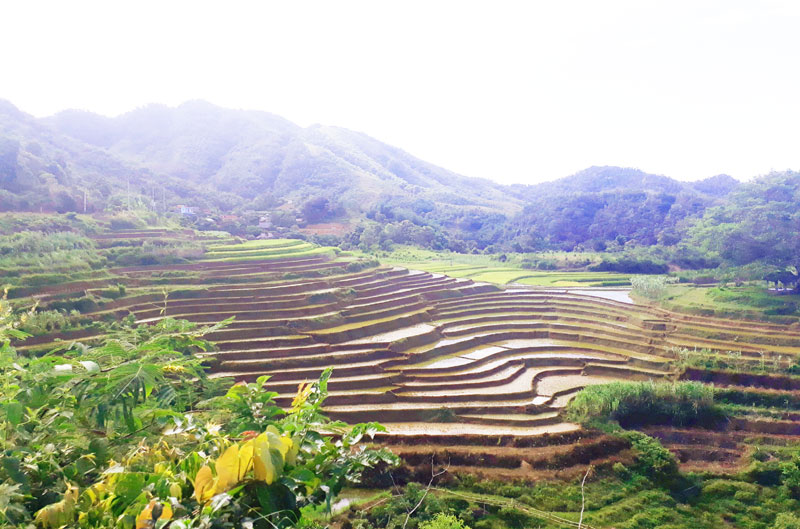
(HBO) - Mung village sits on the highest place in Xuan Phong commune, Cao Phong district with poetic landscape. Despite rough traffic and difficulties in the economy, Mung remains attractive to tourists thanks to its mild and fresh climate, and stilt houses on vast terraced fields.
Apart
from cool mild climate, the scenery of Mung village is dotted with terraced
The
winding fields and glimpses of roofs of stilt houses have made the land
enchanting. Below the foot of the terraced fields is a years-old banyan tree
spanning dozens of meters, which is considered a spiritual symbol of Muong
ethnic village.
The
climate in Mung is cool all year round thanks to its higher geographic location
than surrounding area. In particular, Mung is considered a green lung with
520ha of natural forest zoned off for protection. We visited the family of Ms.
Bui Thi Om, 73 and were invited to drink a cup of water boiled with medicinal
herbs picked in the forest. She said the forest brings cool mild climate,
bamboo shoots and firewood to local residents so that it must be protected for
later generations. "In the past, the road was enough for only a motorbike, but
now thanks to the Party and State support, local lives have improved a lot with
easier access to bigger roads and electricity”, she said.
Bui Van
Linh, chief of Mung village, said though lives have improved, local residents
still mainly live on bamboo shoots, corn, cassava and rice so that their income
remain low. Mung is still an especially difficult village with an annual
average income per capita of 12 million VND (2017), 6 million VND lower than
that in Xuan Phong commune. In order to sustainably reduce poverty, Linh and
locals have thought a lot to find a new direction, most recently travel idea.
"The
village has cool climate, lush green forests, beautiful terraced fields, and
intact traditional culture of Muong ethnic group. Many groups of tourists
visited the village and expressed their impression on local scenery and people
here so we found out that Mung holds potential of tourism development. In
April, departments, agencies, mass organizations and households in the village
(70 people) held tours of Moc Chau in Son La province and Lac village in Mai
Chau district to learn about their experience in community-based tourism.
Following such visits, we hope that authorities would offer support to us to
develop tourism in the future”, Linh said./.
Located just a 20-minute drive from Hoa Binh City, Ora Hill Farmstay & Glamping Hoa Binh is a captivating new destination nestled in Mo hamlet, Bình Thanh commune, Cao Phong district. Combining farming with leisure, this tranquil retreat is perfect for those seeking balance, joy, and an immersive experience in the expansive beauty of nature.
Muong Bi - Tan Lac is renowned as one of the four famous Muong regions in Hoa Binh province. Blessed by nature with a favourable climate and stunning landscapes, Tan Lac holds great advantages for tourism development. The local tourism industry has made remarkable strides in recent times thanks to the attention and support from the local authorities and sectors.
With its strategic location, well-developed transport network, and diverse soil and climatic conditions, Hoa Binh is emerging as a must-visit destination in Vietnam's northwestern tourism corridor. The province boasts numerous attractions, including the Kim Boi hot springs (Kim Boi district), the Dau Rong cave complex (Cao Phong), the Mai Chau valley (Mai Chau), and the iconic Hoa Binh hydropower plant.
The northern mountainous province of Hoa Binh has been listed among the 71 most beautiful places to visit worldwide by the prestigious US travel magazine Condé Nast Traveller.
Hoa Binh province’s rich natural and cultural resources position it as a prime location for developing community-based tourism (CBT). In recent years, support from central and provincial policies, as well as assistance from non-governmental organisations, have encouraged local ethnic minority and mountainous communities to actively engage in the sector.



